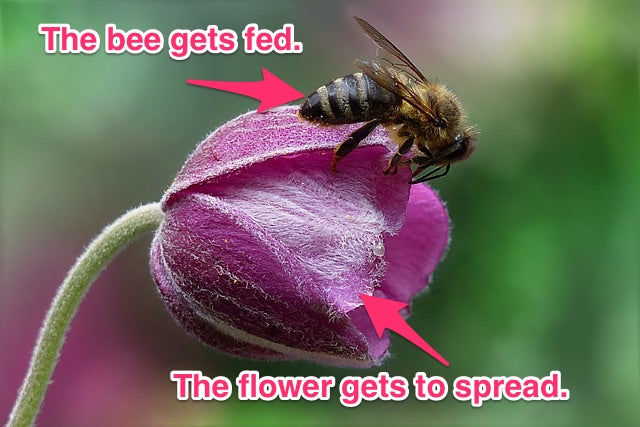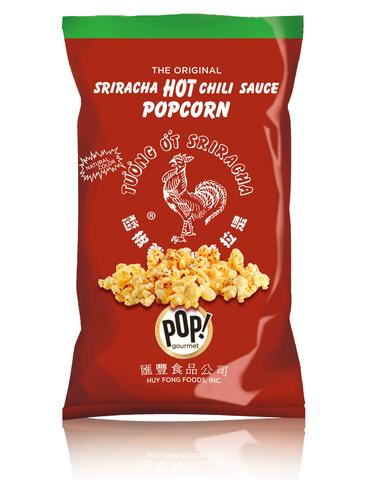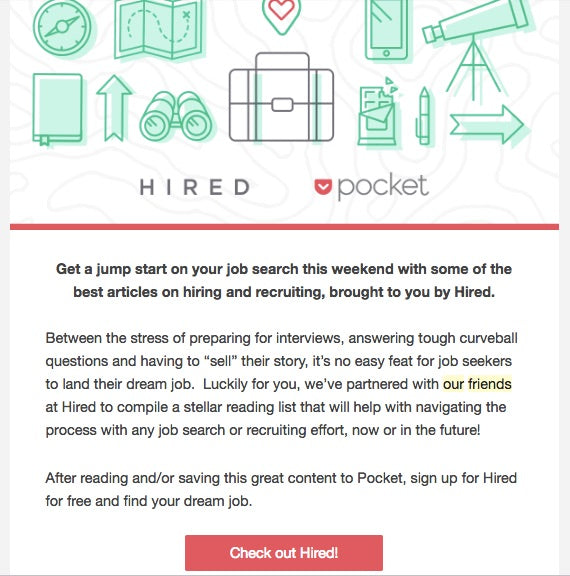Co-Marketing: How to Reach New Customers With Strategic Partnerships

Building a business can be a lonely endeavour. But marketing one doesn’t have to be.
Co-marketing is about sharing audiences and resources between two complementary brands to execute a campaign that neither one could do as effectively alone.
These strategic partnerships can benefit big businesses and new startups alike, sharing what they have instead of building from scratch to get more exposure for each of their products or services.
The benefits of co-marketing include:
- Being more cost-effective by pooling together resources like marketing budgets and talent.
- Sharing audiences of similar people who are already qualified as potential customers.
- Creating and fostering a positive long-term relationship between brands as they help each other out.
- Delighting customers with free stuff, giveaways and co-branded products.
Co-marketing campaigns will take on different forms for B2B vs. B2C brands, for products vs. services, for new startups vs. established brands. However, with a little creativity, you can connect the dots between you and a partner brand to expand the impact of both of your marketing efforts.
But first, let’s talk about one of the core tenants of co-marketing: Reciprocity.
Always ask: What’s in it for you both?
A good co-marketing campaign benefits everyone involved: you, your partner and the customer.
Co-marketing is hard to pitch if the benefits are one-sided. Entering into the agreement has to make sense business-wise for both parties. Don't only think about what's in it for you.
Not only do the benefits have to go two-ways, but they should be proportionate—that is, one party shouldn't reap a big reward while the other just gets the scraps.
Think about how bees and flowers help each other out.

The bees get the nectar they need to thrive from the flower and the flower gets to take advantage of the bee's mobility to spread its pollen. There's a fair balance when it comes to the benefits that exist in this relationship.
Now apply that analogy to two complementary brands and you’ll see how these non-competitive relationships can be useful for everyone involved.
The exchange can be anything from:
- Harnessing the reputation of another brand while giving them exposure to more potential customers.
- Sharing the emails you capture from a campaign that you both contribute resources to execute.
- Doing a guest appearance on each other's blogs, YouTube channels, podcasts, Snapchat accounts or email lists.
- Showcasing your partner's brand in front of your audience in exchange for getting some time in front of theirs.
- Getting samples of your product into the hands of qualified customers in exchange for delighting another company's customers with free stuff.
If the nature of the exchange is fair and the terms are explicit, co-marketing can be an effective way to tap into new audiences, and drive down the cost of marketing while improving its impact .
The hard part will be finding a like-minded partner you can work with.
Free Webinar:
Marketing 101
Struggling to grow sales? Learn how to go from first day to first sale in this free training course.
How to find and create strategic partnerships
There are as many opportunities for co-marketing as you care to look for, but sourcing them all comes down to some old-fashioned networking and business development.
Ideally, you'll be on the lookout for the following criteria in your partner:
- They aren't a competitor—or better yet, they complement you.
- They have a sizeable audience (email list, social following, etc.)
- They are a similar-sized company and aren't "too big to work with you".
You’ll have an easier time if you have an existing relationship with someone there who can help implement the co-marketing campaign.
But if that's not the case, which is likely if you're a new company, you can still make it happen.
There are 3 free tools I’d recommend for this purpose:
- Clearbit Connect to help you find the email you need to reach out to the contacts you want.
- Streak to help you track when your emails are opened, build and manage contact lists, and save templates that you can re-use on an ongoing basis.
- SimilarWeb to help you evaluate a potential partner's website as an opportunity by analyzing the amount of traffic, traffic sources and other signals that identify a good partnership.
But before you reach out to another company, make sure you have some ideas to pitch.
Without any marketing ideas, it’s unlikely you'll get a reply, let alone a "Yes, let's work together". And like I said, you need to frame your pitch in a way where your partner benefits.
Here's an email outreach template you can use to get started:
Hi [NAME],
I'm the [JOB TITLE] at [COMPANY & LINK TO YOUR SITE], a [QUICK ELEVATOR PITCH].
I wanted to reach out to you about a partnership with [PARTNER COMPANY], because [SHOW YOU DID YOUR RESEARCH].
Here's what I propose: [CO-MARKETING IDEA].
Since [EMPHASIZE THE BENEFIT TO THEM], I thought you might be interested in working together on a campaign.
Let me know if this sounds good to you or if you have any other ideas for working together.
Thanks,
[YOUR NAME]
Once you've settled on a like-minded partner, it’s important to negotiate and establish:
- What the campaign will look like and how each party will benefit.
- Who will be responsible for what, so that everything that needs to be done actually gets done.
- What the goals are for the campaign so you both know what to pursue.
- The trackable links you'll be using to attribute the results for any online co-marketing campaigns (I recommend Effin Amazing UTM Builder for creating these). You learn more about how to create these links here.
Still, all of this doesn't matter if you don't have an idea for a good campaign. So here are some co-marketing ideas, examples, and great partnerships to inspire you.
Learn more: How to Find a Business Partner
Launch a co-branded product: Taco Bell and Doritos
Co-branding a new product or piece of content is one of the most direct partnerships you can create.
Unlike the other ideas below, this one involves creating a new product. The benefit here is that brand equity—the consumer's perceptions and feelings about both brands—is combined and transferred to this new product.
Doritos and Taco Bell, one of the most successful co-branding partnerships in the history of fast food, is an example of a co-marketing match made in heaven.
Here you have two brands whose products appeal to similar audiences, whose “brand voices” share common qualities.
Today's the day. Get your free #DoritosLocosTaco between 2-6 p.m. while supplies last. https://t.co/XZYX0PO9POpic.twitter.com/6lOIvnShgO
— Taco Bell (@tacobell) June 21, 2016
Together, they launched a Doritos-shell taco that became a wildly popular menu item at Taco Bell.
Another example of successful co-branding is the popular Sriracha hot sauce brand teaming up with POP! Gourmet to expand Sriracha's reach through snack products such as Sriracha-flavored popcorn.
“There are no dollars involved”—they exchange exposure to a new audience (provided by POP! Gourmet) for brand equity (provided by Sriracha).

Collaborate on a contest: Cineplex and The Weather Network
Contests are a proven way to capture emails, create social media engagement, attract new visitors who have never interacted with your brand, and even get your products into the hands of happy winners.
While many brands execute contests alone, you can double your reach by teaming up in creative ways.
For example, Cineplex (one of the biggest movie theatre operators in North America) teamed up with The Weather Network (a weather-based media company) for #WeatherOrNot, a publicity stunt and contest that involved a 20 foot tall bag of popcorn and a lightning rod in an area of Canada aptly named "Lightning Alley".
Participants could vote if they thought lightning would strike the bag and pop the 'corn. Cineplex offered free popcorn for winners, while The Weather Network got to turn the weather into a topic with mass appeal.

This unlikely pairing of brands makes a lot of sense when you consider that both of these companies are both headquartered in Canada, are top players in their respective categories, and don't compete in any way.
For more on executing your own contest, check out How to Grow Your Business With Viral Contests and Giveaways.
Ship samples with your partner's orders: HDX Hydration and Clean Bottle
There’s no better way to get people to try your product than to give away free samples.
But unless you're strategic about it, you can end up giving your samples to people who might never buy from you.
How do you ensure you're distributing samples to only the most qualified consumers? You give it to folks who are already qualified customers for a like-minded brand.
That's why HDX Hydration, a sports drink mix, teamed up with Clean Bottle, an easy-to-clean water bottle. By inserting samples of their HDX Hydration mix into orders of Clean Bottle that shipped, they were able to expose customers to their product in a way that enhanced the overall unboxing experience of Clean Bottle.
Listen to the full interview with the founder below or jump to the segment on how HDX Hydration created this partnership.
Borrow each other's email list: Pocket and Hired
Perhaps the easiest type of co-marketing campaign to agree upon is a simple exchange of broadcasting platforms.
Most brands are investing time and effort into building audiences of their own—whether it's through social media or an email list.
These audiences are assets that you and your partner can exchange to promote a message—whether it's a one-time email or an entire campaign.
Take this email I got from Pocket, an app for saving articles to read later, that features their partner Hired, a job search site where companies apply to you.
With one email, Hired got to expose an already-established list of new potential users to their service and Pocket got to apply their product in a real-life use case with a curated reading list.

You need to give before you get
The world of business might be competitive by nature, but co-marketing opens new doors through cooperation.
While big brands team up on co-marketing campaigns all the time, it's an especially appealing strategy for smaller companies without a lot of money to spend on marketing.
After all, why build an audience from scratch or scrounge up scarce resources when you can share what you and other like-minded brands already have?
Co-marketing only works if you're willing to offer up something that makes it worth your partner's time and effort. You need to give before you get, but what you end up getting together is something you likely wouldn't have gotten alone.
